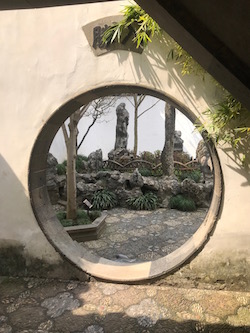Middle of the Middle
Context: "With text," from the Latin, "to weave together." In nearly seven years of teaching college composition, mostly to freshman students at NYU, "context" has emerged as one of the most important and difficult concepts to get across in the classroom, to put into practice, to put in context. Part of the problem and also the necessity is that the context of what you are writing about, thinking about, experiencing, discovering exists whether you see it or not, but it's also something you must acknowledge, create of your own accord.
Currently, living in Shanghai and teaching freshman composition at NYU's satellite campus here, I am some way in context but also very much out of it. In my nearly too months here, I have developed small routines--of yoga on Mondays, groceries on Sundays, massages each week, video calls to friends and family back home. These actions no longer feel revelatory. I can no longer count the times I've done downward dog after the command in Chinese, but still I do not know the words. I can't say my stomach is fully adapted to the richness of the food, but I'm also using chopsticks like a pro (and I've always been the one who asks for a fork) and demanding more spice. This middle space isn't like the elation of first having arrived and thinking, "Wow!" with every step, even when people are barking at me, and I imagine this middle space is not like being here a few years, or a little more, the "trap" so many expats talk about, where you get used to the massages, where your family grows and gets comfortable here. This middle space in the Middle Kingdom--it's been a difficult and exhausting week, finding myself smack-dab in that middle-ness, seeing my context-less-ness in context.
Often, when we teach context, we talk to our students about picture frames: "You need to limit context to make it digestible, but you want to make sure to put enough inside the picture to make it beautiful, to make what you are showing feel whole and real." But how do we choose? And how we teach making the best choices? And how best to critique the choices others have made--including other writers? Politicians? Our students? Ourselves?
Last week was an exhausting and week in Shanghai--feeling both tired of it and also still utterly bewildered--and I pushed myself past the gauntlet of the rush hour subway and the commuter train to visit a new friend in Suzhou, a city full of traditional Chinese gardens, just a half hour down the high speed track. And, in a slow morning spent at Lion's Grove garden--just one of the 9 in Suzhou listed as UNESCO world heritage sites, that I chose for its small size, and ease of finding, having been warned of crowds--I was happy to discover twisting passageways and hidden corners like treasures, so many frames and angles, where the context was created for me, over and over, created so carefully so many, many years ago, where I could simply wander and admire the choices that someone else had made with no complaint.
